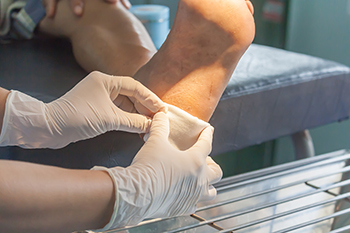Healing of Foot Ulcers
Tuesday, 28 May 2024 00:00
Foot ulcers are open wounds that occur on the bottom of the foot or around the toes. They can range in size from small sores to larger, more severe wounds. These ulcers develop from a combination of medical factors, such as poor circulation, nerve damage, and high blood sugar levels, particularly in individuals with diabetes. Additionally, non-medical reasons like improper footwear, foot deformities, and injuries can contribute to their formation. Diagnosis involves a thorough examination by a podiatrist, often including tests to assess blood flow and nerve function. Foot ulcers differ from other skin conditions by their depth and potential to worsen if left untreated, leading to serious complications like infection or even amputation. If you have a foot ulcer, it is strongly suggested that you schedule an appointment with a podiatrist for prompt treatment, which may involve wound care, infection management, pressure relief, and addressing related underlying medical conditions.
Wound care is an important part in dealing with diabetes. If you have diabetes and a foot wound or would like more information about wound care for diabetics, consult with Milos Tomich, DPM from Dr. Tomich Foot & Ankle Health Center. Our doctor will assess your condition and provide you with quality foot and ankle treatment.
What Is Wound Care?
Wound care is the practice of taking proper care of a wound. This can range from the smallest to the largest of wounds. While everyone can benefit from proper wound care, it is much more important for diabetics. Diabetics often suffer from poor blood circulation which causes wounds to heal much slower than they would in a non-diabetic.
What Is the Importance of Wound Care?
While it may not seem apparent with small ulcers on the foot, for diabetics, any size ulcer can become infected. Diabetics often also suffer from neuropathy, or nerve loss. This means they might not even feel when they have an ulcer on their foot. If the wound becomes severely infected, amputation may be necessary. Therefore, it is of the upmost importance to properly care for any and all foot wounds.
How to Care for Wounds
The best way to care for foot wounds is to prevent them. For diabetics, this means daily inspections of the feet for any signs of abnormalities or ulcers. It is also recommended to see a podiatrist several times a year for a foot inspection. If you do have an ulcer, run the wound under water to clear dirt from the wound; then apply antibiotic ointment to the wound and cover with a bandage. Bandages should be changed daily and keeping pressure off the wound is smart. It is advised to see a podiatrist, who can keep an eye on it.
If you have any questions, please feel free to contact one of our offices located in Milwaukee and Wauwatosa, WI . We offer the newest diagnostic and treatment technologies for all your foot care needs.




